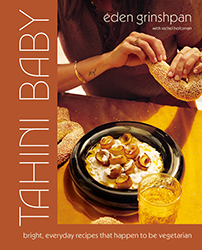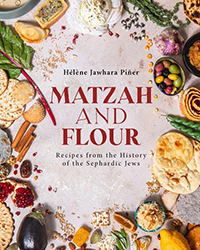“Opulent” and “nosh” may sound like oxymorons. As Ken Albala writes at the opening of this cookbook, “nosh” comes from the Yiddish word nashn, which means “to nibble.” Nothing could be less opulent, it would seem! But, as Albala suggests, why eat ordinary meals when you could eat “exquisite little dishes,” perhaps served with a delicious mug of tea or a lovely cocktail? Noshing isn’t eating a full course, but it isn’t quite snacking, either; it’s a sort of meal, a tasty little ritual. (Albala notes that the pandemic was “weirdly liberating, at least in terms of meals,” so why confine ourselves to old-fashioned rules?)
Albala is a professor, chef, and the author/editor of more than twenty-five books on food, and he brings all of his knowledge to Opulent Nosh. The book is divided into more than a dozen sections — from toast and sandwiches to grain bowls and soups — and pairs more than a hundred mouthwatering recipes with vibrant photos and descriptive writing (as well as humorous opinions). Drawing on his work as a food historian, Albala melds different cuisines. He turns classic American Cream of Wheat cereal into fritters, pairing them with mayonnaise and caviar, and tops sweet Japanese shokupan bread with halloumi cheese and broccoli. Albala also decontextualizes classics from his Sephardic Jewish heritage and Turkish grandmother, including fruit-and-nut charoset, matzo brei, homemade bagels, and his take on the Reuben sandwich (which uses steak instead of corned beef). He pairs ingredients together not in pursuit of “fusion,” he says, but rather to promote the idea that “any ingredients that taste good together belong together.” As he says, the recipes in the cookbook “can be found [here] only,” and they are indeed unique.
There’s something a bit incongruous about noshing being occasionally time-consuming or calling for certain difficult-to-source ingredients. For instance, the delicious-sounding southern Indian idli cakes with almond butter and persimmon chutney require two bouts of fermentation over four days. Other recipes call for goose stock, butterfly pea flower powder, and dried white mulberries — ingredients that not everyone is likely to have access to.
But Albala seems to recognize this, and in fairness, he features numerous familiar favorites, from muffins to tuna melts. He explains that the recipes he has created should invite creativity, serving as jumping-off points for interested home cooks. (If someone has a jar of sumac languishing in a cupboard, this is the time to use it!) After all, these small dishes are intended to be opulent and audacious, treated with all the care one would devote to a feast.





